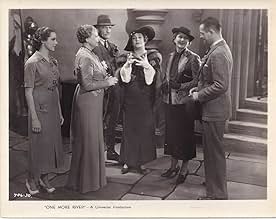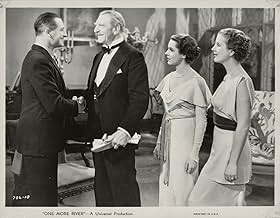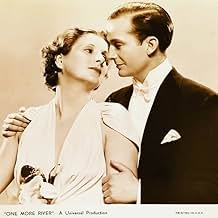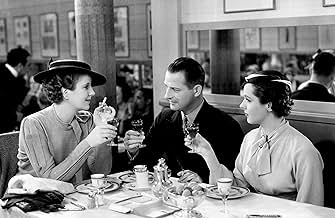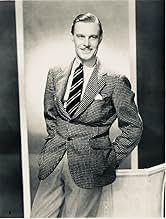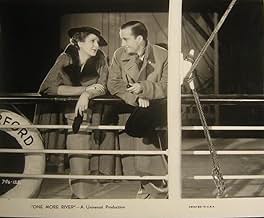अपनी भाषा में प्लॉट जोड़ेंA young lady leaves her brutal husband and meets another man aboard a ship.A young lady leaves her brutal husband and meets another man aboard a ship.A young lady leaves her brutal husband and meets another man aboard a ship.
- निर्देशक
- लेखक
- स्टार
फ़ीचर्ड समीक्षाएं
"One More River" (1934) stars Diana Wynyard, Frank Lawton, Colin Clive as top-liners, but the rest of the cast is stellar! Mrs. Patrick Campbell, C. Aubrey Smith, Jane Wyatt, Reginald Denny, Henry Stephenson, Lionel Atwill, Alan Mowbray, Kathleen Howard, Gilbert Emery, E. E. Clive, and the list just keeps on going. This Universal Studios produced film will have most thinking it was made in England, as most of the stars and even the sets are about as English as can be. Beautifully appointed and directed by James Whale, just after coming off of "The Invisible Man" and just prior to "Bride of Frankenstein", this was more of a diversion for Whale, yet he handles it with major aplomb. Many today will consider the theme of suit for divorce based on adultery rather tame, and this would have had even more of a jolt in 1934 had the Code not just gone into effect, but the finished product still has the ability to hold our attention. Wynyard had just come off of her nomination for Best Actress Oscar for "Cavalcade", but she's much better here, and her quiet, if not elegant, though stolid performance serves the part well. She's matched by the ruthless, somewhat fey, but catty nastiness of her film husband, Colin Clive, in a part that shows he had genuine talent that captured range. Frank Lawton, who passionately loves Wynyard, and who is accused of being the co-respondent in the case against Wynyard, is less well-suited, but effective enough.
Written by John Galsworthy, this was much more potent when first released as a novel, but Whale has whittled the novel down to 88 minutes of film, and he's done it very effectively. The film is talkative, but its pristine presentation still packs a punch. Gorgeous cinematography, good direction, fine acting all around - this is recommended highly actually, though many today will wonder what all the hoopla is about. In effect, the film is now dated, and because it lacks the buzz-buzz of so much activity on screen, the CGI, the crash and bang of today's typical hit, let's say it will play better to those looking for something, not cerebral, but soap-operaish in an old-fashioned way.
Written by John Galsworthy, this was much more potent when first released as a novel, but Whale has whittled the novel down to 88 minutes of film, and he's done it very effectively. The film is talkative, but its pristine presentation still packs a punch. Gorgeous cinematography, good direction, fine acting all around - this is recommended highly actually, though many today will wonder what all the hoopla is about. In effect, the film is now dated, and because it lacks the buzz-buzz of so much activity on screen, the CGI, the crash and bang of today's typical hit, let's say it will play better to those looking for something, not cerebral, but soap-operaish in an old-fashioned way.
This is a superior film, but its impact is attenuated by the great changes in social attitudes toward sex and divorce which have occurred since the time it was filmed. The conflicts and tensions in the story could only occur today in third world nations or very religious communities. Thus, most American viewers can wonder what all the excitement is about.
Diana Wynyard is a revelation. When the film began, she appeared a bit on the plain side. However, she became enchantingly beautiful as the movie progressed. Her soft, pleasant, kind features and the exquisite shape of her head and body impressed me more and more, as did her calm manner and then her assertive testimony in court.She became irresistible.
Universal gave this a veneer of a prestige production. It looked like it was shot in England, except that most of the English performers were already old Hollywood hands. Jane Wyatt wisely didn't try for an English accent. Whales' direction was seamless, but not as flashy as his more famous horror productions. He kept things moving briskly.
Diana Wynyard is a revelation. When the film began, she appeared a bit on the plain side. However, she became enchantingly beautiful as the movie progressed. Her soft, pleasant, kind features and the exquisite shape of her head and body impressed me more and more, as did her calm manner and then her assertive testimony in court.She became irresistible.
Universal gave this a veneer of a prestige production. It looked like it was shot in England, except that most of the English performers were already old Hollywood hands. Jane Wyatt wisely didn't try for an English accent. Whales' direction was seamless, but not as flashy as his more famous horror productions. He kept things moving briskly.
A woman finds herself sued for divorce by the brutish husband who beat her with a riding whip. The kind of situation that would be unthinkable today but which was probably considered to be quite saucy back in the 1930s, despite the terribly proper tone of R. C. Sheriff's screenplay. When Dana Wynyard and Frank Lawton both gaze beyond the camera, and he says, ever so matter-of-factly, "You realise, of course, that I love you," it's impossible not to laugh. It's a pleasant enough watch, but it's tone is inconsistent and often inappropriately humorous
Today, 1930s director James Whale is best remembered for "Frankenstein", "The Invisible Man", and "The Bride of Frankenstein", as well as for being probably the only openly gay person in cinema at the time (Ian McKellen played him in 1998's "Gods and Monsters"). Lesser known are Whale's dramas. There was "Waterloo Bridge", about a relationship strained by World War I, and "One More River", about a woman who flees an abusive marriage and hooks up with someone else. Not something usually depicted back then, so I wonder if it would've even been possible once the Hays Code went into effect the following year.
It's not a masterpiece, but passable. I find these fetishistic looks at the British ruling class weird (especially considering Whale's dirt-poor childhood). I suppose that nowadays, such a movie - whether focusing on the working class or ruling class - would probably come from Pedro Almodovar. Diana Wynyard, Jane Wyatt, Colin Clive (Dr. Frankenstein in Whale's more famous movies) and Frank Lawton all turn in fine performances.
It's not a masterpiece, but passable. I find these fetishistic looks at the British ruling class weird (especially considering Whale's dirt-poor childhood). I suppose that nowadays, such a movie - whether focusing on the working class or ruling class - would probably come from Pedro Almodovar. Diana Wynyard, Jane Wyatt, Colin Clive (Dr. Frankenstein in Whale's more famous movies) and Frank Lawton all turn in fine performances.
One More River (1934)
*** (out of 4)
This James Whale directed melodrama is technically good and the performances are fine but I'd still rank it rather low in regards to the director's filmmography. A woman (Diana Wynyard) goes to England to try and escape her abusive husband (Colin Clive) and on the ship ride over has a nice man (Frank Lawton) fall in love with her. Even though her husband is abusive, she refuses to go any further with the new man and it doesn't take long for the husband to show up and cause trouble. ONE MORE RIVER was based on a very popular novel that of course had to be trimmed down for the big screen due to the production code going into full swing during this period. For the most part I thought the film featured some very good performances from its excellent cast and there's no question that it's rather impressive on a technical side. The biggest issue I had with the film was actually the pacing, which just seemed extremely slow to me and it really took forever for the film to finally pick up some speed. There's no question that the material is old-fashioned but this isn't the reason it goes so slow. Again, the best thing going are the performances with Wynyard really standing out as the abused woman trying to do what's right. Lawton is also good in his role as the man who loves her and Clive proves what a talent he was in just a few scenes. Jane Wyatt appears in his first role and we get good support from Reginald Denny, Henry Stephenson, Lionel Atwill and C. Aubrey Smith.
*** (out of 4)
This James Whale directed melodrama is technically good and the performances are fine but I'd still rank it rather low in regards to the director's filmmography. A woman (Diana Wynyard) goes to England to try and escape her abusive husband (Colin Clive) and on the ship ride over has a nice man (Frank Lawton) fall in love with her. Even though her husband is abusive, she refuses to go any further with the new man and it doesn't take long for the husband to show up and cause trouble. ONE MORE RIVER was based on a very popular novel that of course had to be trimmed down for the big screen due to the production code going into full swing during this period. For the most part I thought the film featured some very good performances from its excellent cast and there's no question that it's rather impressive on a technical side. The biggest issue I had with the film was actually the pacing, which just seemed extremely slow to me and it really took forever for the film to finally pick up some speed. There's no question that the material is old-fashioned but this isn't the reason it goes so slow. Again, the best thing going are the performances with Wynyard really standing out as the abused woman trying to do what's right. Lawton is also good in his role as the man who loves her and Clive proves what a talent he was in just a few scenes. Jane Wyatt appears in his first role and we get good support from Reginald Denny, Henry Stephenson, Lionel Atwill and C. Aubrey Smith.
क्या आपको पता है
- ट्रिवियाAccording to Jane Wyatt, "[James Whale] was crazy about Mrs. Pat [Mrs. Patrick Campbell]. The set was kind of run for her. The whole thing was to get her relaxed. She was playing up a lot about how nervous she was, and I think she got an awful lot of attention that way. i think we felt sorry for Mrs. Campbell. Poor dear--how ever are they going to pull her together. That was my reaction. We all had to pull her together and help her through.
- गूफ़In the opening scene, the liner pulling into the London dock that lady Corven arrives on is seen in the establishing shot is clearly named the ORFORD, yet after a we see her and Tony speak on the deck, another establishing shot of the ship now shows it is one called the ORSOVA.
- कनेक्शनReferenced in Gods and Monsters (1998)
टॉप पसंद
रेटिंग देने के लिए साइन-इन करें और वैयक्तिकृत सुझावों के लिए वॉचलिस्ट करें
विवरण
- चलने की अवधि1 घंटा 28 मिनट
- रंग
- पक्ष अनुपात
- 1.37 : 1
इस पेज में योगदान दें
किसी बदलाव का सुझाव दें या अनुपलब्ध कॉन्टेंट जोड़ें

